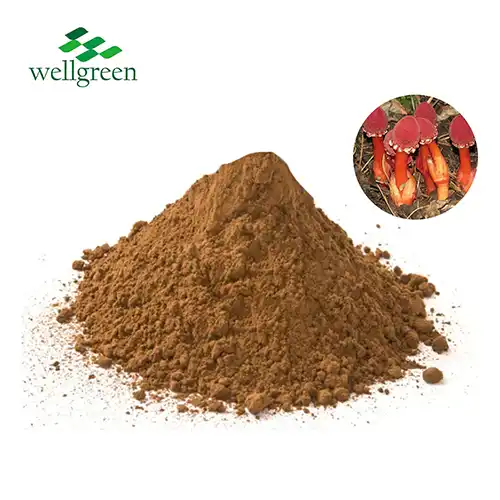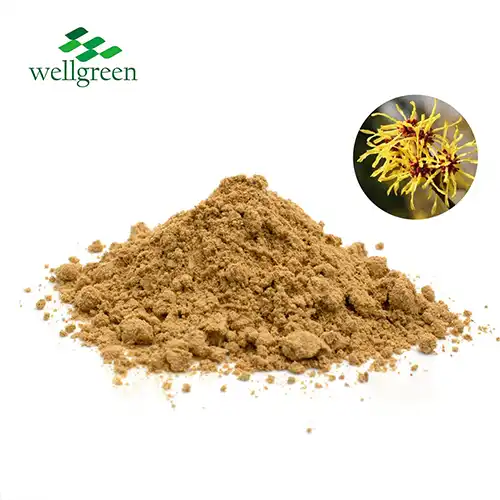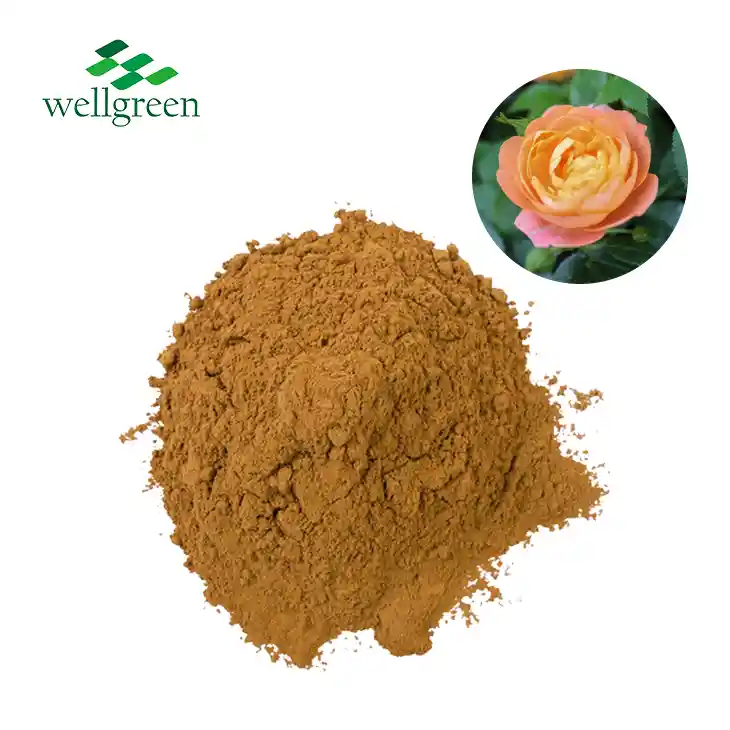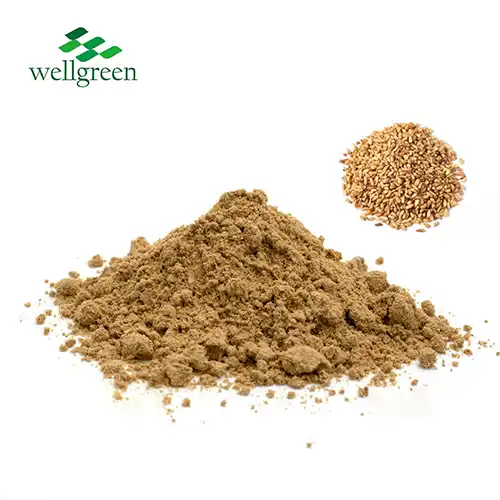What are the Active Compounds in Fennel Seed Extract Powder?
2025-04-07 13:56:47
Fennel seed extract powder is a concentrated form of the beneficial compounds found in fennel seeds. The active compounds in fennel seed extract powder include anethole, fenchone, estragole, and various flavonoids such as quercetin and kaempferol. These phytochemicals contribute to the powder's aromatic flavor and its potential health benefits. Anethole, the primary compound, is responsible for fennel's distinctive licorice-like taste and aroma. It also possesses antioxidant and anti-inflammatory properties. Fenchone adds a camphor-like note and may have antimicrobial effects. Estragole contributes to the extract's flavor profile and potential digestive benefits. The flavonoids present in fennel seed extract powder are known for their antioxidant activities, which may help protect cells from oxidative stress.
Key Active Compounds in Fennel Seed Extract
Anethole: The Primary Phytonutrient
Anethole is the most abundant and significant compound in fennel seed extract powder. This aromatic compound belongs to the phenylopropanoid class of chemicals and is responsible for the characteristic anise-like flavor and scent of fennel. Research has shown that anethole possesses various biological activities, including antioxidant, antimicrobial, and anti-inflammatory properties. Its presence in fennel seed extract powder contributes to many of the potential health benefits associated with this natural product.

Fenchone and Its Aromatic Properties
Fenchone is another essential component of organic fennel extract powder. This monoterpene ketone imparts a camphoraceous aroma and contributes to the overall flavor profile of fennel. Beyond its sensory attributes, fenchone has been studied for its potential antimicrobial and antioxidant activities. The presence of fenchone in fennel seed extract powder enhances its versatility in both culinary and potential therapeutic applications.
Estragole: A Controversial Compound
Estragole, also known as methyl chavicol, is a natural organic compound found in fennel seed extract powder. While it contributes to the extract's flavor, estragole has been the subject of some controversy due to potential toxicological concerns at high doses in animal studies. However, the levels present in fennel seed extract powder are generally considered safe for culinary use. It's important to note that the overall composition of fennel seed extract powder, with its diverse array of compounds, may mitigate any potential risks associated with individual components.
Health Benefits of Fennel Seed Extract Powder
Antioxidant Properties and Cellular Protection
Fennel seed extract powder is rich in antioxidants, including flavonoids like quercetin and kaempferol. These compounds help neutralize harmful free radicals in the body, potentially reducing oxidative stress and cellular damage. The antioxidant properties of fennel seed extract powder may contribute to its overall health-promoting effects, supporting various bodily functions and potentially aiding in the prevention of chronic diseases associated with oxidative stress.
Anti-inflammatory Effects and Chronic Disease Prevention
The active compounds in fennel extract powder, particularly anethole, have demonstrated anti-inflammatory properties in various studies. Chronic inflammation is linked to numerous health issues, including cardiovascular diseases, diabetes, and certain cancers. By incorporating fennel seed extract powder into one's diet, individuals may potentially benefit from its anti-inflammatory effects, which could contribute to overall health and well-being. However, more research is needed to fully understand the extent of these benefits in humans.
Potential Hormonal Balance Support
Fennel seed extract powder contains phytoestrogens, plant compounds that can mimic the effects of estrogen in the body. These compounds have been studied for their potential to support hormonal balance, particularly in women. Some research suggests that fennel seed extract may help alleviate symptoms associated with menstrual disorders and menopause. However, it's important to note that the effects of phytoestrogens can be complex, and more research is needed to fully understand their impact on hormonal health.
How Fennel Seed Extract Powder Supports Digestion?
Carminative Properties and Gas Relief
Fennel seed extract powder is renowned for its carminative properties, which means it can help reduce gas formation in the digestive tract and alleviate bloating. The active compounds in fennel, particularly anethole, may help relax the smooth muscles in the gastrointestinal system, facilitating the expulsion of gas and reducing discomfort. This makes fennel seed extract powder a popular natural remedy for digestive issues such as flatulence and bloating.

Stimulation of Digestive Enzymes
Research suggests that fennel seed extract powder may stimulate the production of digestive enzymes. These enzymes are crucial for breaking down food and absorbing nutrients effectively. By potentially enhancing enzyme activity, fennel seed extract powder could contribute to improved digestion and nutrient absorption. This property may be particularly beneficial for individuals experiencing digestive discomfort or those looking to optimize their digestive health.
Potential Prebiotic Effects
Emerging research indicates that fennel seed extract powder may have prebiotic properties. Prebiotics are substances that promote the growth of beneficial gut bacteria. The fiber content and specific compounds in fennel seed extract powder could potentially nourish and support the growth of probiotic organisms in the gut. A healthy gut microbiome is essential for proper digestion, immune function, and overall health. While more studies are needed to confirm these effects, the potential prebiotic activity of fennel seed extract powder adds to its appeal as a digestive aid.
Conclusion
Fennel seed extract powder is a remarkable natural product rich in active compounds that contribute to its potential health benefits. From its primary component anethole to various flavonoids, these phytochemicals work synergistically to offer antioxidant, anti-inflammatory, and digestive support. While research continues to explore the full extent of fennel seed extract powder's effects, its long history of use and promising scientific findings make it an intriguing option for those seeking natural ways to support their health and well-being.
Contact Us
If you're interested in learning more about our high-quality fennel seed extract powder or other organic plant extracts, please don't hesitate to reach out to us at wgt@allwellcn.com. Our team is ready to assist you with any questions you may have about our products and how they can benefit your health or business.
References
1. Badgujar, S. B., Patel, V. V., & Bandivdekar, A. H. (2014). Foeniculum vulgare Mill: A review of its botany, phytochemistry, pharmacology, contemporary application, and toxicology. BioMed Research International, 2014, 842674.
2. Kooti, W., Moradi, M., Ali-Akbari, S., Sharafi-Ahvazi, N., Asadi-Samani, M., & Ashtary-Larky, D. (2015). Therapeutic and pharmacological potential of Foeniculum vulgare Mill: A review. Journal of HerbMed Pharmacology, 4(1), 1-9.
3. Rather, M. A., Dar, B. A., Sofi, S. N., Bhat, B. A., & Qurishi, M. A. (2016). Foeniculum vulgare: A comprehensive review of its traditional use, phytochemistry, pharmacology, and safety. Arabian Journal of Chemistry, 9, S1574-S1583.
4. Sánchez-Martínez, J. D., Bueno-Hernández, N., Katzin-Zukerman, R., & Vázquez-Frias, R. (2020). The use of fennel in treating gastrointestinal disorders. Revista de Gastroenterología de México (English Edition), 85(3), 307-314.
5. Shahat, A. A., Ibrahim, A. Y., Hendawy, S. F., Omer, E. A., Hammouda, F. M., Abdel-Rahman, F. H., & Saleh, M. A. (2011). Chemical composition, antimicrobial and antioxidant activities of essential oils from organically cultivated fennel cultivars. Molecules, 16(2), 1366-1377.
6. Zhao, J., Jiang, L., & Tang, X. (2019). Isolation and identification of chemical constituents from fennel (Foeniculum vulgare) and their antimicrobial activities. Natural Product Research, 33(21), 3151-3155.






